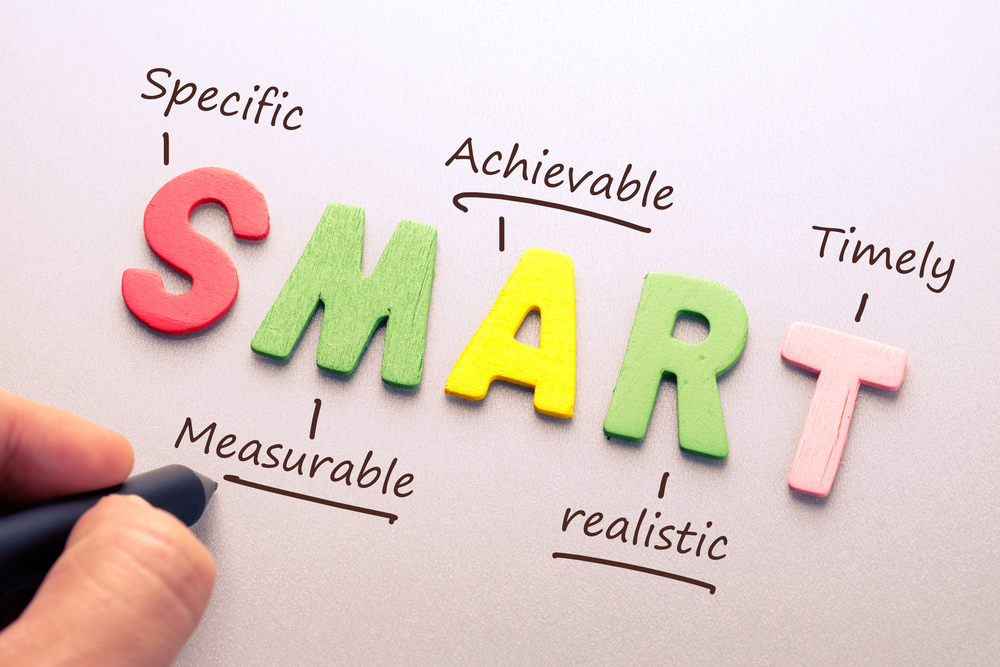Juggling work and school is a challenge for a lot of college students, but if you stay motivated and organized, it is a lot easier. It’s all about smart planning, managing your time, and staying committed to both your job and your classes.
Studies from Columbia University have found that students who work typically have lower GPAs than those who don’t. Balancing work and study can seriously affect your grades, so it’s important to find ways to set goals for college to help you stay on track.
But don’t sweat it, working while studying isn’t an impossible task. It just means you’ve got to find the right equilibrium. This might mean setting a solid schedule, prioritizing your to-dos, and making sure you’ve got some downtime. Remember, you’re not just trying to scrape by, but to knock it out of the park in both your job and your studies.
Work + Study: Long Term Goals for College Students

Juggling the demands of a job and college calls for some clear-cut, achievable goals. Here are a few goalposts that can help you stay on track, keep your cool, and earn that degree.
- First, setting priorities is crucial. Determine what tasks are most important and need to be done first. This could be studying for an upcoming exam or completing a work project.
- Second, time management is key. Create a schedule that includes both work and study time, and stick to it. This can help ensure that neither area is neglected.
- Third, don’t be afraid to ask for help. Whether it’s from colleagues at work or professors at college, seeking assistance when needed can make the balancing act more manageable.
- Last, remember to take care of your health. Regular exercise, a healthy diet, and adequate sleep can boost your energy levels and improve your ability to focus.
Related: How to Get Involved on Campus
Time Management Goals
Mastering time management is a key ingredient for success in any field. It’s not just about organizing and planning your days to complete tasks more efficiently, but also about understanding your priorities, setting personal goals, and creating a balance between work and leisure. Here are some examples:
- Create a Schedule: Designating specific hours for work, study, and leisure can help you maintain a balanced lifestyle. This could involve using digital tools or traditional planners to map out your day. For instance, you might allocate 9am-12pm for studying, 1pm-5pm for work, and 6pm onwards for relaxation and leisure activities.
- Prioritize Tasks: Not all tasks are created equal. Determine which tasks are most critical and tackle them first. This could involve creating a to-do list each day and marking high-priority items. For example, if you have an exam coming up, studying for it should take precedence over less urgent tasks.
- Avoid Procrastination: Procrastination can lead to stress and poor quality work. Setting firm deadlines for assignments and sticking to them can help you stay on track. For instance, if you have a project due in a week, you might set a goal to finish the first draft in three days.
Related: Thriving: How to Succeed in College
Academic Goals
Balancing the twin duties of job and school can sure be a tough gig. The secret to keeping things steady is setting clear, doable school goals. Here are some possible targets that can steer working students towards school success:
- Maintain Good Grades: Setting a target GPA each semester can motivate you to study harder. Regularly reviewing course material and seeking help when needed can help you achieve this goal.
- Participate in Class: Active participation in class discussions and group projects can enhance your understanding of the subject matter and develop your communication skills.
- Complete Degree Requirements: Keeping track of required courses and credits ensures that you’re making progress towards your degree.
Related: How to Save Money as a College Student and Make College a Budget-Friendly Experience
Career Goals
Career goals are targets that guide your career path. They can be anything from your aspirations to the actionable steps you need to take to reach your destination. Here are some examples:
- Gain Relevant Experience: Look for aspects of your current job that align with your career goals. If you want to become a project manager, for example, seek out opportunities to lead small projects or teams.
- Build Professional Network: Networking events, industry conferences, and social media platforms can be excellent ways to connect with professionals in your field.
- Develop Job Skills: Identify the skills most valued in your desired career and seek out opportunities to develop these, whether through coursework, online tutorials, or practical experience.
Related: How to Prepare for College
Personal Development Goals
Personal development goals are objectives you set to improve your skills and capabilities, and also to grow as an individual. Setting these goals helps you maximize your potential and create the life you want. Here are some examples:
- Improve Communication Skills: Joining a debate club or taking a public speaking course can help you become a more confident communicator.
- Stay Healthy: Regular exercise and a balanced diet are crucial for maintaining physical health, which in turn can support your academic performance.
- Practice Self-Care: Make sure to set aside time for relaxation and activities you enjoy to prevent burnout and maintain mental well-being.
Related: Succeed in College: Mental Health Resources for College Students
Creating SMART Goals

SMART is an acronym that stands for Specific, Measurable, Achievable, Relevant, and Time-bound. Creating SMART goals can help you stay motivated, celebrate small successes, and balance competing demands.
Specific
A specific goal is well-defined and clear, providing a concrete path towards success. It answers the questions: What do I want to accomplish? Why is it important? Who is involved? Where is it located? Which resources or limits are involved?
For example, instead of saying “I want to do well in school”, a more specific goal would be “I want to achieve a 3.5 GPA this semester”. This goal clearly states what you want to achieve (a 3.5 GPA), why it’s important (to do well in school), and when you want to achieve it (this semester).
Measurable
A measurable goal allows you to track your progress and stay motivated. It answers the question: How much? How many? How will I know when it is accomplished?
If your goal is to improve your public speaking skills, you might measure progress by the number of presentations you give. You could set a goal to give one presentation per month, allowing you to clearly track your progress and see improvement over time.
Achievable
An achievable goal is realistic and attainable. It should stretch your abilities but still remain possible. It answers the question: How can I accomplish this goal?
While it’s good to aim high, setting impossible goals can lead to frustration and demotivation. For example, if you’re working full-time while studying, setting a goal to study 8 hours a day might not be achievable. A more achievable goal might be to study two hours each day.
Relevant
A relevant goal aligns with your long-term objectives and values. It answers the question: Does this seem worthwhile? Is this the right time? Does this match my other efforts/needs?
If you’re studying business, a relevant goal could be to attend at least two networking events or industry conferences in the next three months. This goal is time-bound, relevant to your career objectives, and can provide valuable opportunities for learning and making professional connections.
Time-bound
A time-bound goal has a clear deadline, creating a sense of urgency and motivating you to take action. It answers the question: When? What can I do six months from now? What can I do six weeks from now? What can I do today?
For example, if your goal is to read 12 books this year, setting a deadline (e.g., one book per month) ensures that you stay on track and helps prevent procrastination.
Remember, SMART goals are not set in stone. They can be adjusted as circumstances change or as you gain more insight into what you truly want to achieve.
College Goals for Different Life Stages

Whether you’re a high school graduate stepping into the world of higher education, or a mid-level professional considering further studies, each stage of your academic journey comes with its own unique set of goals. Here’s a look at what you might expect:
High School Graduates
As a student fresh out of high school, transitioning to college can be a major shift. Your objectives might include:
- Adjusting to College Life: This could involve acclimating to a new routine, learning to cohabit with dorm mates, and effectively managing your time.
- Exploring Potential Career Paths: As a freshman, you might not have a concrete idea of your professional aspirations. College is an excellent opportunity for you to delve into various majors and potential career trajectories.
- Making New Friends: Cultivating a robust social network can be a vital aspect of your college experience. This could involve participating in clubs, engaging in extracurricular activities, or simply hanging out with your friends.
Related: Synchronous vs Asynchronous Classes: Choosing an Online College Program
Mid-Level Professionals
As a mid-level professional considering graduate school, your goals are likely to be career-oriented:
- Boosting Your Career: You might be going back to school to acquire the skills and qualifications necessary to move up in your current job or switch to a different field.
- Building Your Professional Network: Graduate programs often offer chances to meet industry professionals, alumni, and fellow students who could become important connections down the line.
- Acquiring Specialized Knowledge: Whether you’re looking to master technical skills or delve into academic theory, gaining specialized knowledge is often a major goal for mid-level professionals returning to school.
Related: How to Choose Online Degree Programs for Working Adults
Be Successful
Wrapping it up, setting goals in college isn’t a one-time gig, it’s an ongoing process that needs periodic attention and dedication. Whether you’re fresh out of high school just kick-starting your journey or a seasoned pro getting back to the grind, your goals will be your compass.
Goals will help you juggle the demands of work and study, and they’ll steer you towards personal and professional growth. Don’t forget to make your goals SMART – Specific, Measurable, Achievable, Relevant, and Time-bound.
Our tips will ensure your goals are on point, doable, and in sync with your big picture. So go ahead, set your goals, enjoy the ride, and watch yourself evolve into the best version of you.
Frequently Asked Questions
An example of a SMART goal could be: “I will read 20 pages of a book every day for the next month to finish reading the book.”
A short-term goal is an outcome you want to achieve in the near future, typically within a year. For example, a short-term goal could be: “I will learn to play one song on the guitar within the next three months.”



